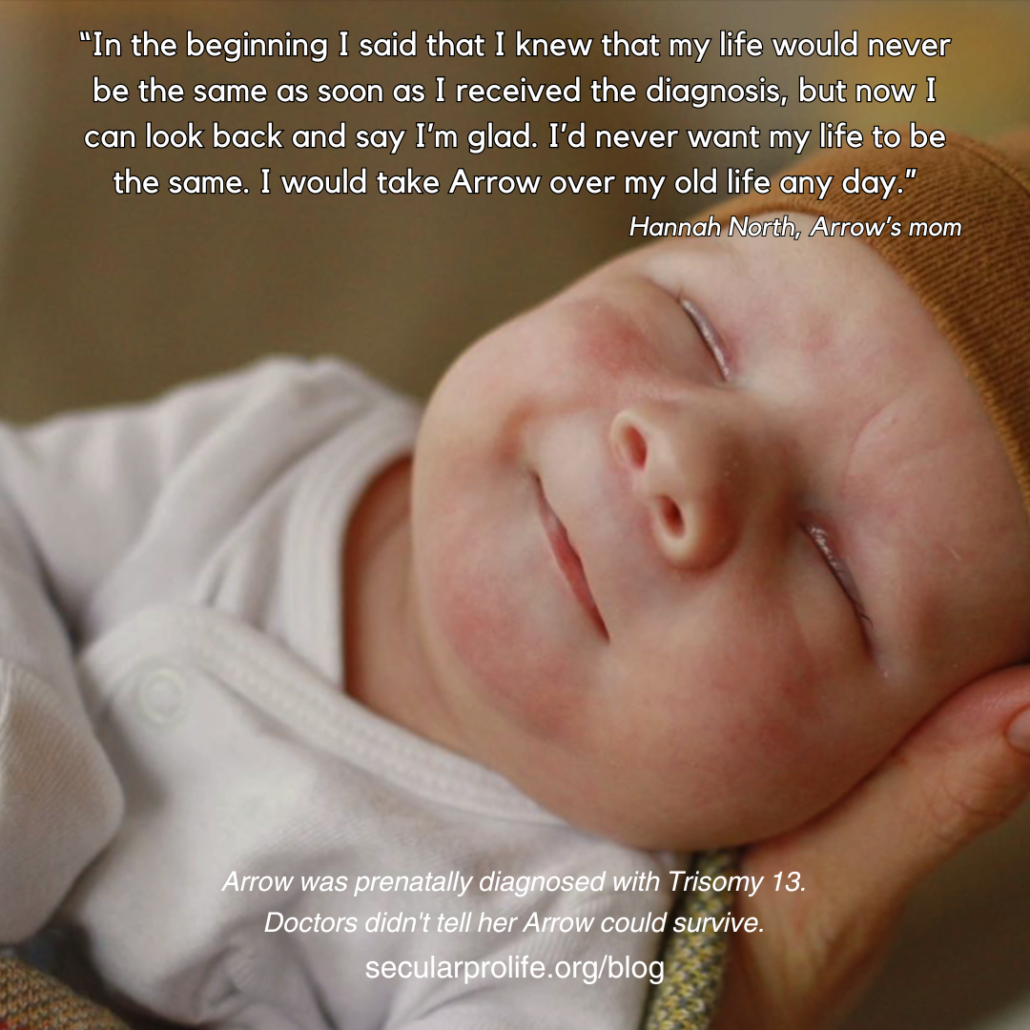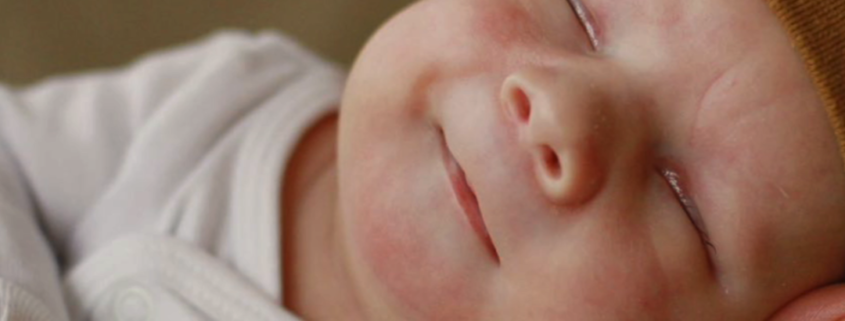Arrow was prenatally diagnosed with Trisomy 13. Doctors didn’t tell her Arrow could survive.
March is Trisomy Awareness Month. Trisomies are conditions when, instead of having the typical two copies of a chromosome, someone has three copies. Probably the most well known trisomy is Trisomy 21, or Down syndrome, which is caused by a third copy of the 21st chromosome (which is why Down Syndrome Awareness Day is 3/21). However there are other forms of trisomies. Today (3/13) we will share a story about Patau’s Syndrome, or Trisomy 13.
Hannah North recorded this testimony when her son, Arrow, was two years old. At the time we publish this blog post, Arrow is now three years old.
If you have received a prenatal diagnosis (of a trisomy or otherwise) and are willing to share your experience, please fill out our survey here.
Many thanks to our volunteer Janelle for transcribing Hannah’s video. If you’d like to volunteer with us, please fill out our volunteer intake form here.
Hi, my name is Hannah, and I have a two year old son who has full Trisomy 13. His name is Arrow. At 20 weeks we found out that Arrow had full Trisomy 13.
Pregnancy with a diagnosis was the darkest time of my life, full of trauma and grief, and feeling very alone.
At the time I only knew Trisomy 13 to be a death sentence, and I came across a group on Facebook that was full of families who had been given a Trisomy 13 diagnosis for their child and had chosen to carry to term. There were varying outcomes but I noticed that a lot of these kids were living, their families loved them, and that they were happy. Hey there’s more possibilities here than just death.
The doctors didn’t have a whole lot of conversation with me about Trisomy 13; they would tell me to go do my own research. I wasn’t really told that there was different possibilities and different outcomes. I was given, repeatedly, the option of a “selective reduction,” the option to discontinue his life and to continue to carry my other son.
We ended up getting a fetal MRI and a fetal echocardiogram to confirm some really concerning things they were seeing on the ultrasounds. These tests showed us that a lot of the things they were seeing weren’t actually there. We found out that he had a really strong heart and a pretty good brain. At that point I had this little glimmer of hope that, wow, my son might be one of these kids that makes it. If I mentioned it to the doctors they would shoot it down pretty quickly.
And it was about that time that I decided to give Be Not Afraid a call. And after I explained the whole situation to Tracy on the phone, she said, “Wow, it sounds like your baby has a chance.”
I just wept because it was the first time somebody had echoed my suspicion that my baby might make it. But also to have somebody confirm even if my baby didn’t make it, that walking through this pregnancy and carrying to term was the best thing to do. BNA helped me prepare myself to advocate for my baby; that was very empowering.
So at 35 weeks I went in for an ultrasound and Arrow was not doing well. The doctor told me that if I wanted to birth him alive, that I needed to deliver right away, so I checked in and I was induced. The NICU doctor on call let me know that what she specialized in were babies that were born in the NICU with special needs, and that she firmly believed that having a family that loved them and advocated for them was a big factor in them doing well. And so I was, again I was crying, just so thankful and amazed that I had a team of doctors and nurses that were for my baby, and it was everything.
So the babies were born at 35 weeks and Arrow was taken to the NICU; he was transferred to the children’s hospital because he needed a surgery right away. He was born with cutis aplasia, which usually they can just let that heal on its own but he had a major vein exposed. So he was transferred to the children’s hospital for that surgery at three days old, and he spent 39 days in the NICU. The doctors, for the most part they treated him like they would treat his twin or any other child, and didn’t discriminate against him based on his disability.
The first year with Arrow was tough, it was hard, but I would still say that pregnancy was the hardest part. Getting used to going to the doctor maybe three, four times a week. He had several surgeries and a few unplanned hospital stays. It was a lot. When we got to his first birthday we felt like we had accomplished the biggest feat.
I think that our story is an example of what’s possible when a woman and a baby receive the care that they need. I had the support of Be Not Afraid during my pregnancy, so I had someone to turn to and someone to help me advocate and help me just walk that entire journey.
The NICU doctors and all of the doctors that have treated Arrow since he was born have all valued him and his life and given him a chance, and because of those factors we are where we are, and I couldn’t be any more grateful. That is not the case for so many in our Trisomy communities and it’s really unfortunate.
[Read more – Parents can hear you]
We are still fighting the label “incompatible with life” because as long as our children carry that label so many of them are denied care, they’re denied life-saving interventions, and denied the care that they need to thrive.
The fact that we think that babies who are normal and healthy are the only ones who can live a valuable life, it’s just plain prejudice and ableism. Babies born with disabilities can still live happy, meaningful lives, maybe not even despite their disabilities but because of them.
We don’t know what each child is capable of unless we give them a chance. Some babies might not make it to birth, but their life still has value. Some babies might make it to birth but not make it much further, and their life still has value, and their families still find so much joy in them.
But to get a full evaluation of a baby after birth is the goal. Nobody knows what the baby is capable of just by looking at an ultrasound.
There is a time and a place for comfort care, and sometimes that is the compassionate choice for a baby, and sometimes you can tell that a baby is capable of more and you let them fight. And that’s what happened in our situation, because we gave him a chance, he’s still here and he’s living a happy, valuable life, and it’s all been worthwhile.
At the end of the day, this is our life, it is not a job like it is for a doctor. This is our life and we’re the only ones that have to live with the decisions that we make, so it’s really important that our voices are heard, and that our decisions are valued.
Arrow isn’t defined by his Trisomy 13; he’s not defined by his disability. His life has inherent worth because he breathes in and breathes out and he has a heartbeat. And yes, my life is more difficult and more complicated, but in the beginning I said that I knew that my life would never be the same as soon as I received the diagnosis, but now I can look back and say I’m glad. I’d never want my life to be the same. I would take Arrow over my old life any day. He has added so much joy and fullness to our lives and we can’t imagine our stories without him.




